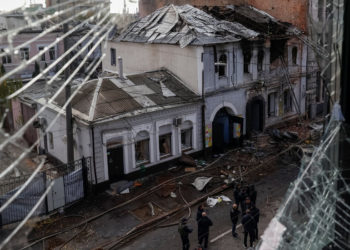France’s Louvre Museum and its culture minister, Rachida Dati, both hit back at criticisms of the security setup at probably the world’s most famous museum, .
“Have the Louvre’s security precautions failed? No, they have not failed. That is a fact. The security measures worked,” Dati said during a question-and-answer session in parliament on Tuesday.
Dati’s comments didn’t quite dismiss those doubts that had been raised about the alarm systems, however, as their complete failure was not in question.
Punctual alarms? Upgraded display cases
Paris’ prosecution service had only said on Tuesday that “the checks on the functionality of the alarm systems are continuing.”
What was at issue was not whether the alarms sounded at all, but whether they sounded immediately when the thieves entered, or just one minute before they made their escape. A slow alert for police could have proven harmful to efforts to reach the museum on time.
The museum, meanwhile, defended the state of the display cases from which the thieves took items from the Apollo Gallery on Sunday.
“The Louvre Museum asserts that the display cases installed in December 2019 represented considerable progress in terms of security, given the degree of obsolescence of the old equipment, which would have led, without replacement, to the works being removed from public view,” the museum said in a statement on Tuesday.
In the heist, thieves parked a truck outside and used an extendable movers’ ladder to access the Apollo Gallery shortly before upening. They climbed up, cut the jewels free from display cases, and fled in a matter of minutes.
They made off with eight pieces deemed priceless, including an emerald-and-diamond necklace that Napoleon I gave to his wife, Empress Marie-Louise, and a diadem dotted with nearly 2,000 diamonds that once belonged to Empress Eugenie.
Louvre remains shut amid fears jewels may already be smelted
following the heist, as .
Tim Carpenter, head of the art protection organization Argus Cultural Property Consultancy, and long the head of the FBI’s art crimes division, warned that it was much easier to melt down jewels and sell them as precious metals than it was, say, to monetize a stolen famous painting or artwork.
The heist has put security at French cultural sites under sudden and increased scrutiny, amid allegations of budget shortfalls and corner-cutting in recent years.
Also on Tuesday, in separate but related news, charges were laid against a Chinese-born woman accused of stealing gold nuggets worth more than $1.5 million from Paris’ Museum of Natural History last month. The 24-year-old was arrested in Barcelona while trying to dispose of nearly 1 kilogram of melted gold pieces.
Two other institutions were hit in September, and in January of this year, Louvre President Laurence des Cars had warned Culture Minister Daichi of a “worrying level of obsolescence” in the museum’s security capabilities, including the partial absence of basics like video surveillance.
The specialist Paris police unit known as the BRB, which has more than a dozen agents specialized in museum thefts in its ranks of around 100 investigators, has taken over the Louvre case.
Edited by: Jenipher Camino Gonzalez
The post France: Louvre, government deny security shortfalls in heist appeared first on Deutsche Welle.




